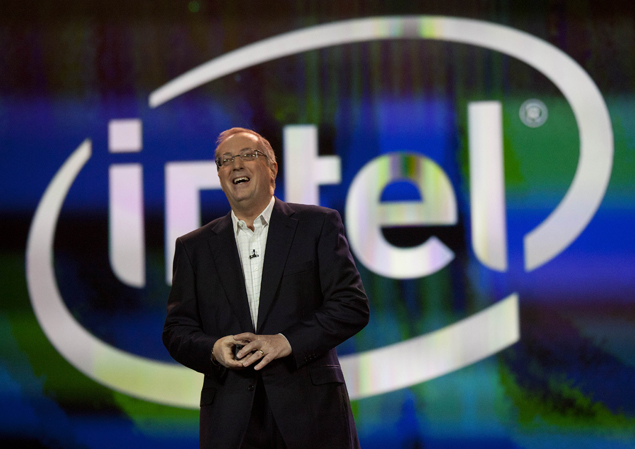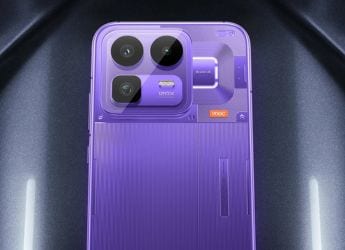- Home
- Mobiles
- Mobiles News
- How Intel blew the opportunity to be inside the original iPhone
How Intel blew the opportunity to be inside the original iPhone
By Anupam Saxena | Updated: 17 May 2013 13:06 IST

Click Here to Add Gadgets360 As A Trusted Source

Advertisement
As Intel's former CEO Paul Otellini hands over the charge to Brian Krzanich, he reveals that he missed a chance to get Intel's processor inside the first iPhone.
In an interview with The Atlantic, Otellini disclosed that Apple had approached Intel to source a chip that they wanted to put in the iPhone but there were differences in the price that Apple was willing to pay and what Intel estimated.
"We ended up not winning it or passing on it, depending on how you want to view it. And the world would have been a lot different if we'd done it," Otellini said.
He also added that his gut told him to say yes. There was also a sign of regret. "The lesson I took away from that was, while we like to speak with data around here, so many times in my career I've ended up making decisions with my gut, and I should have followed my gut," said Otellini. "My gut told me to say yes."
"The thing you have to remember is that this was before the iPhone was introduced and no one knew what the iPhone would do... At the end of the day, there was a chip that they were interested in that they wanted to pay a certain price for and not a nickel more and that price was below our forecasted cost. I couldn't see it. It wasn't one of these things you can make up on volume. And in hindsight, the forecasted cost was wrong and the volume was 100x what anyone thought."
It's not clear from the interview if Apple wanted the iPhone to be powered by Intel's x86 chips or, as is more likely, Apple wanted Intel to manufacture ARM chips on contract. Going by the Steve Jobs biography by Walter Isaacson, Jobs had his reasons for not going with Intel chips for the iPhone.
"There were two reasons we didn't go with them. One was that they [the company] are just really slow. They're like a steamship, not very flexible. We're used to going pretty fast. Second is that we just didn't want to teach them everything, which they could go and sell to our competitors," said Jobs.
This implies that Apple did not choose Intel as it was not sure of the company's existing chips and of the company's ability to offer a customised solution in time. It also didn't want Intel using its know-how to help competitors.
He is quoted saying,"At the high-performance level, Intel is the best.They build the fastest, if you don't care about power and cost." Jobs also added that "We [Apple] tried to help Intel, but they don't listen much."
However the book also features a rebuttal from Otellini saying that the two companies did not agree on the price and on who'd control the design of the chip.
While Intel has been a late entrant to the smartphone chips segment as its early Atom chips were not optimised for offering a good battery life, there were some reports before the launch of the original iPhone that quoted an Apple executive saying that the phone runs on an Intel powered chip. Even Intel had said that Apple had committed to use its 'Silverthorne' chip in multiple products.
Apple's first iPhone ended up using an ARM chip produced by Samsung. Till the last generation, all iPhones ware powered by chips designed by Apple and manufactured by Samsung.
An year prior to the release of the iPhone, Apple had released the first Macs that were powered by Intel processors before moving to a completely Intel based architecture in 2009.
Meanwhile Intel is trying to get its share in the mobile chipsets segment partnering with device manufacturers to power Android based smartphones as it faces tough competition from the likes of Samsung, Qualcomm and even Nvidia.
In an interview with The Atlantic, Otellini disclosed that Apple had approached Intel to source a chip that they wanted to put in the iPhone but there were differences in the price that Apple was willing to pay and what Intel estimated.
"We ended up not winning it or passing on it, depending on how you want to view it. And the world would have been a lot different if we'd done it," Otellini said.
He also added that his gut told him to say yes. There was also a sign of regret. "The lesson I took away from that was, while we like to speak with data around here, so many times in my career I've ended up making decisions with my gut, and I should have followed my gut," said Otellini. "My gut told me to say yes."
"The thing you have to remember is that this was before the iPhone was introduced and no one knew what the iPhone would do... At the end of the day, there was a chip that they were interested in that they wanted to pay a certain price for and not a nickel more and that price was below our forecasted cost. I couldn't see it. It wasn't one of these things you can make up on volume. And in hindsight, the forecasted cost was wrong and the volume was 100x what anyone thought."
It's not clear from the interview if Apple wanted the iPhone to be powered by Intel's x86 chips or, as is more likely, Apple wanted Intel to manufacture ARM chips on contract. Going by the Steve Jobs biography by Walter Isaacson, Jobs had his reasons for not going with Intel chips for the iPhone.
"There were two reasons we didn't go with them. One was that they [the company] are just really slow. They're like a steamship, not very flexible. We're used to going pretty fast. Second is that we just didn't want to teach them everything, which they could go and sell to our competitors," said Jobs.
This implies that Apple did not choose Intel as it was not sure of the company's existing chips and of the company's ability to offer a customised solution in time. It also didn't want Intel using its know-how to help competitors.
He is quoted saying,"At the high-performance level, Intel is the best.They build the fastest, if you don't care about power and cost." Jobs also added that "We [Apple] tried to help Intel, but they don't listen much."
However the book also features a rebuttal from Otellini saying that the two companies did not agree on the price and on who'd control the design of the chip.
While Intel has been a late entrant to the smartphone chips segment as its early Atom chips were not optimised for offering a good battery life, there were some reports before the launch of the original iPhone that quoted an Apple executive saying that the phone runs on an Intel powered chip. Even Intel had said that Apple had committed to use its 'Silverthorne' chip in multiple products.
Apple's first iPhone ended up using an ARM chip produced by Samsung. Till the last generation, all iPhones ware powered by chips designed by Apple and manufactured by Samsung.
An year prior to the release of the iPhone, Apple had released the first Macs that were powered by Intel processors before moving to a completely Intel based architecture in 2009.
Meanwhile Intel is trying to get its share in the mobile chipsets segment partnering with device manufacturers to power Android based smartphones as it faces tough competition from the likes of Samsung, Qualcomm and even Nvidia.
Comments
Catch the latest from the Consumer Electronics Show on Gadgets 360, at our CES 2026 hub.
Related Stories
Popular on Gadgets
- Samsung Galaxy Unpacked 2025
- ChatGPT
- Redmi Note 14 Pro+
- iPhone 16
- Apple Vision Pro
- Oneplus 12
- OnePlus Nord CE 3 Lite 5G
- iPhone 13
- Xiaomi 14 Pro
- Oppo Find N3
- Tecno Spark Go (2023)
- Realme V30
- Best Phones Under 25000
- Samsung Galaxy S24 Series
- Cryptocurrency
- iQoo 12
- Samsung Galaxy S24 Ultra
- Giottus
- Samsung Galaxy Z Flip 5
- Apple 'Scary Fast'
- Housefull 5
- GoPro Hero 12 Black Review
- Invincible Season 2
- JioGlass
- HD Ready TV
- Laptop Under 50000
- Smartwatch Under 10000
- Latest Mobile Phones
- Compare Phones
Latest Gadgets
- Infinix Note Edge
- Lava Blaze Duo 3
- Tecno Spark Go 3
- iQOO Z11 Turbo
- OPPO A6c
- Samsung Galaxy A07 5G
- Vivo Y500i
- OnePlus Turbo 6V
- Lenovo Yoga Slim 7x (2025)
- Lenovo Yoga Slim 7a
- Lenovo Idea Tab Plus
- Realme Pad 3
- Garmin Quatix 8 Pro
- NoiseFit Pro 6R
- Haier H5E Series
- Acerpure Nitro Z Series 100-inch QLED TV
- Asus ROG Ally
- Nintendo Switch Lite
- Haier 1.6 Ton 5 Star Inverter Split AC (HSU19G-MZAID5BN-INV)
- Haier 1.6 Ton 5 Star Inverter Split AC (HSU19G-MZAIM5BN-INV)
© Copyright Red Pixels Ventures Limited 2026. All rights reserved.







![[Sponsored] Haier C90 OLED TV | Dolby Vision IQ, 144Hz OLED and Google TV in Action](https://www.gadgets360.com/static/mobile/images/spacer.png)









